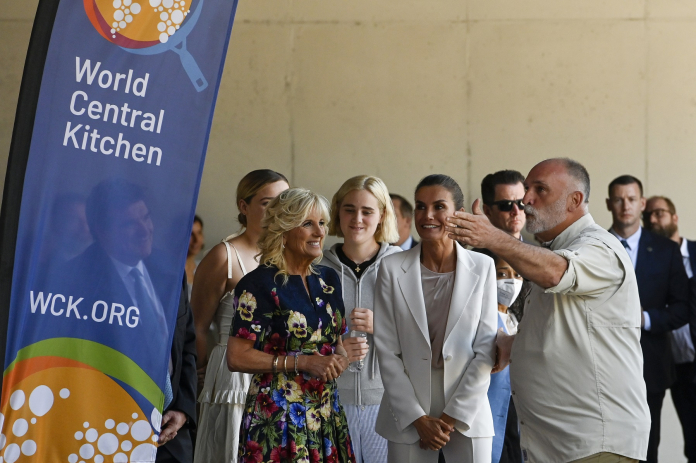Two Tallahassee residents recently returned from volunteering overseas to help Ukrainian refugees.
Bill Rayner, a realtor, and Ginny Owens, co-owner and manager of the Cottages at Lake Ella, spent more than a week in the World Central Kitchen in Przemysl, Poland. (In case you’re wondering, the city’s name is pronounced SHAM-uh-shell.)
The couple was stationed about 10 miles from the border with Ukraine, working in a giant pop-up kitchen where most everything was on wheels.


They and other international volunteers made thousands of hot meals and sandwiches every day. The food was distributed at a train station, a shelter in an abandoned mall, and at the border crossing.
“I regretted that I didn’t go assist New Orleans during Hurricane Katrina” in 2005, Rayner says of his motivation to volunteer near a war zone. “I’m really too old and fat to go fight. So this was something we could do.” Rayner says he never felt like he was in danger.
The World Central Kitchen was founded by Chef Jose Andres in 2010. It isn’t a single place. It can pop up anywhere there’s a humanitarian crisis. In April, a missile hit one of those kitchens, injuring 4 people. But that didn’t stop the meal-making.
“All I can tell you is it was the most amazing experience of my life,” says Owens. The people that we fed at the train station, that was probably the most powerful. We worked all day making that food and then getting to hand it to them and watch their faces, and see the appreciation and the joy.”
Owens gets emotional talking about it, especially a thank you card handed to her by a woman with two children. “We handed her the sandwich, and the tears came down her face,” Owens says. “We had lots of fruit—bananas and apples and oranges. I made sure that we gave her everything, and I told her if she needed more to come back.”
The woman and her children went to a tent to eat. They soon returned. “They came back over and handed me that thank you note and you know, I felt like I should be thanking them for what they were going through. But they took the time to do that, and it meant the world to me.”


Rayner says he and Owens are sharing their experience so they can shine a light on World Central Kitchen.
“A very small core of paid staff multiplied their efforts by just bringing in all these volunteers and ran them very efficiently, and when we were in the distribution centers, we saw the results—these people were getting fed,” Rayner says. “I would encourage anybody who has the time and resources to volunteer. It was a fabulous experience.”
Rayner says he got much more back than he put in. “If you can’t (go), I would say donate money. Everything runs on money, unfortunately.”
Click LISTEN to hear details about their trip and why they’re talking so passionately about it.
More about the food
Rayner says he was a cog in a human sandwich-making machine.
“Every bun gets a little bit of sauce. The next step, somebody lays two pieces of cheese. The next step, somebody lays 10 little salamis, just like we’d get here.” More ingredients are added, then the top bun. The sandwiches are put in a bin and taken to the wrapping station.
“We would run cellophane 30 feet and then we’d put a sandwich at every foot and a half basically,” Rayner says. Then, all 30 feet of sandwiches are rolled over and wrapped, with a knife cutting between the sandwiches so they can be packaged individually. This process went on for hours each day. “We could do probably 20 sandwiches a minute.”
Owens says the hot food line was equally impressive.
“They would have a beautiful salad. There would be bulgur or rice or some type of grain. There would be a hot meat, like with a gravy. There were always vegetables, and then of course, the fruit and all that,” Owens says.
“Then there was always cake. You know, these were full meals that were well thought out, and the people were so appreciative to have a variety.”
To learn about volunteering with the World Center Kitchen, click here.


9(MDA4MzU1MzUzMDEzMTkyMzAwMzY5MjY1Mw004))
9(MDA4MzU1MzUzMDEzMTkyMzAwMzY5MjY1Mw004))


